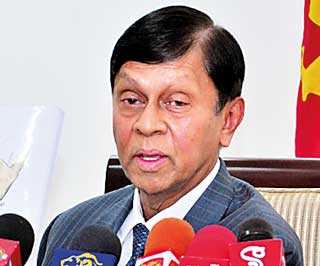Friday Feb 20, 2026
Friday Feb 20, 2026
Thursday, 6 February 2020 02:51 - - {{hitsCtrl.values.hits}}
By Uditha Jayasinghe
Senior Advisor on Economic Affairs to the Prime Minister Ajith Nivard Cabraal yesterday said he would request President Gotabaya Rajapaksa to order an independent and impartial re-investigation into the bond scam, to be conducted by the Criminal Investigations Department (CID).
Cabraal, a former Central Bank Governor, told reporters he had little confidence in the credibility of the forensic audit, the Presidential Commission of Inquiry (PCoI) report, or the Committee on Public Enterprises (COPE) report. He insisted that as the controversial bond scam has remained in the public eye for nearly five years, it was imperative that an investigation that has the trust of the public be conducted.
 |
|
Ajith Nivard Cabraal |
“I believe the CID should conduct this investigation, as this is an organised crime. If they require technical expertise, then that can be provided as necessary. Even though former Governor Arjuna Mahendran is absent, they can still conduct investigations. There is a need to call additional witnesses, people who have not been summoned before, and more attention needs to be paid to segments that have been glossed over by earlier reports. I stand ready to fully support any of these endeavours,” he said.
Cabraal argued that the forensic audit was not credible, as it was conducted under the supervision of the Monetary Board of the Central Bank and the company, KPMG India, who were responsible for the documents, has several allegations against them, and could even be banned by the Indian Government.
He stressed the former Government had engaged in repeated cover-ups of the bond scams, starting with a three-member committee appointed by former Prime Minister Ranil Wickremesinghe, as well as his statements in Parliament, the dissolution of Parliament before the CoPE report could be tabled, and nearly two years lapsing before the Presidential Commission of Inquiry was appointed by former President Maithripala Sirisena.
Cabraal noted that at every point since 2015, he had engaged with authorities and the media to convey his stance, and had continued to do so even after former Central Bank Governor Arjuna Mahendran left the country.
“These accusations are nothing new to me. They have been levelled at me time and again, but I have responded to them in detail every single time. I have come before the media numerous times. Even today, can you get through to any other person who was involved in the bond scam? But you can call me and I will answer.”
“According to details in the forensic report, there has been a loss of Rs. 10.4 billion because of Treasury bills and bonds being issued at lower than base price. However, the report also says that in 2,783 instances issuances were at higher than base prices, so why is it that there is no calculation of profits? If I’m to take responsibility for the losses, then surely I should also get the credit for the profits. My calculations show there was Rs. 28 billion in profits but there is no mention of this in the forensic audit.”
Cabraal contended that according to his calculations, the “unrealised profits” of the Employees’ Provident Fund (EPF) could be Rs. 9 billion, which in his view could offset any losses incurred by the pension fund in market transactions before 2014. The former Governor went onto say that unlike the questionable bond transactions in 2015 and 2016 which benefited Perpetual Treasuries, as much as 96% of the Treasury bills and bond sales were conducted successfully.
“Even of the minute 4% the benefits went to the EPF, Bank of Ceylon, National Savings Bank and People’s Bank, which are all public entities. No private organisations benefitted in any way unlike in the case of Perpetual Treasuries.”